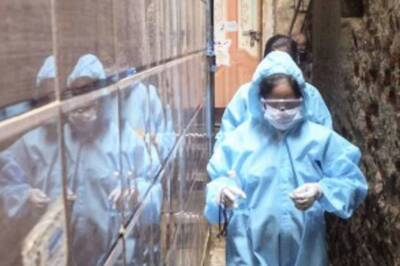
views
Libya: Revolutionary forces celebrated the capture of one Muammar Gaddafi stronghold and closed in on Tuesday on the last holdouts in the fugitive leader's hometown of Sirte, putting total victory in their eight-month uprising just a few city blocks away.
US Secretary of State Hillary Rodham Clinton offered millions of dollars in new aid to Libya, encouraging the country's unsteady new leadership to commit to a democratic future free of retribution.
"I am proud to stand here on the soil of a free Libya," Clinton said on a visit to the capital, Tripoli. "The United States was proud to stand for you in your fight for freedom and we will continue to stand with you as you continue this journey."
Although two months have passed since Gaddafi fled the capital, Libya's new leaders have refrained from declaring national "liberation" until the fall of Sirte, which Gaddafi transformed from a fishing village into a modern city after he seized power in 1969.
Revolutionary forces on Tuesday pushed from the east into the small pocket of the city under the control of Gaddafi loyalists and captured a vegetable market, though they came under heavy fire from snipers and rocket-propelled grenades on the rooftops of residential buildings and homes along major streets.
Abdul-Hadi Ali, fighting with the revolutionary forces, said the battle for Sirte, 250 miles (400 kilometers) southeast of Tripoli, was essentially finished so he was now returning home to the eastern city of Benghazi.
"The fighting in Sirte is nearly over," Ali said, adding that the holdouts were surrounded in a narrow, two-block area. "I think they have a lot of ammunition, but our fighters will fire Grads and get it over with so maybe tomorrow it will be liberated and bombed and we will begin the hunt for Gaddafi."
In an apparent warning that Gaddafi could still threaten the new leadership if he continues to elude capture, Clinton acknowledged in unusually blunt terms that the United States would like to see the ousted dictator dead.
"We hope he can be captured or killed soon so that you don't have to fear him any longer," Clinton told students and others at a town hall-style gathering in the capital. Until now, the US has generally avoided saying that Gaddafi should be killed.
Libyan military spokesman Col. Ahmed Bani said on Monday that the search would intensify after authorities declare victory.
"Now we are trying to liberate Sirte ... and then we will talk about Gaddafi. It's not so important now," he told reporters.
NATO commanders have expressed surprise at the tenacity of the Gaddafi loyalists, who have continued to resist the revolutionaries despite the collapse of the regime and the disappearance of their eccentric leader.
It is unclear whether loyalists who slipped out of the besieged cities of Bani Walid and Sirte might continue the fight and attempt to organize an insurgency using the vast amount of weapons Gaddafi was believed to have stored in hideouts in the remote southern desert.
Unlike Iraq's Saddam Hussein, Gaddafi had no well-organized political party that could form the basis of an insurgent leadership. However, regional and ethnic differences have already appeared among the ranks of the revolutionaries, possibly laying the foundation for civil strife.
Gaddafi has issued several audio recordings trying to rally supporters. Libyan officials have said they believe he's hiding somewhere in the vast southwestern desert near the borders with Niger and Algeria.
The whereabouts of two of his sons also remain unknown, although commanders have said they believe Muatassim and Seif al-Islam are hiding in Sirte and Bani Walid, respectively. Seif al-Islam had been Gaddafi's likely choice to succeed him as Libya's leader.
Anti-Gaddafi fighters combed Bani Walid on Tuesday for signs of Seif al-Islam and other high-level regime figures in the desert enclave, 90 miles (140 kilometers) southeast of Tripoli.
"Seif was seen on Thursday. He was eating in a desert village close to the city," one field commander, Said Younis, said.
The Netherlands-based International Criminal Court has charged Seif al-Islam, his father and Gaddafi's former intelligence chief Abdullah al-Senoussi with crimes against humanity for a brutal crackdown on the uprising.
Bani Walid is a valley city protected by many steep mountains and valleys, where Gaddafi loyalist snipers took positions during the fiercest battles. Younis said many loyalist fighters fled to caves in the mountains as revolutionary forces converged on the valley Sunday evening.
In the backyard of a house in Bani Walid, 10 fighters dug a hole, revealing a cache of Kalashnikov assault rifles and ammunition.
"We've been finding weapons and ammunition hidden in people's yards since we liberated the city," Ayman Mahdi said Tuesday as he dug.
Another field commander, Ahmed Saad, said forces acting on tips from prisoners also were searching for underground tunnels similar to those found under Gaddafi's former Bab al-Aziziya compound in Tripoli.
The city center was largely deserted on Tuesday except for trucks carrying revolutionary fighters, many firing weapons in the air. Buildings were pockmarked from bullets and rocket fire.
The breakthrough in Bani Walid occurred after fighters received much-needed ammunition and supplies, commander Ali Abdel-Rahman said. He said revolutionary troops lost three fighters but otherwise faced little resistance.
"We didn't find a regular army but only loyalists of Gaddafi, snipers with automatic weapons," he said. "Some of the Gaddafi brigades took off their uniforms and vanished."
He said even families had fled the area. "There was a widespread perception that there would be a massacre here and pools of blood, but on the contrary, it was very bloodless, swift and with no resistance."
With the fall of Bani Walid and the imminent capture of Sirte, a NATO spokeswoman said Tuesday that the alliance's bombing campaign was nearing a close but that it was still too early to set an exact date.
"We are very close to the end, but there are still threats to the civilian population," Carmen Romero said.
In Tripoli, Clinton met with Libya's acting prime minister, Mahmoud Jibril, and offered about $11 million in additional aid. The fresh aid boosts Washington's contribution since the uprising against Gaddafi began in February to roughly $135 million.
The new aid package includes medical aid for wounded fighters and additional assistance to secure weaponry that many fear could fall into the hands of terrorists. Aides said the money is meant partly as a pledge to ongoing US support during what will be a difficult passage to free elections and a new government after four decades of dictatorship.
"Now the hard part begins," Clinton said, heading into a meeting with the transitional leaders.
Clinton referred several times to the importance of including all factions in a future democratic government, a reference to fears among Libyans that those with ties to the Gaddafi regime will be punished.
"The most important thing now is to make sure that Gaddafi and his regime are finally prevented from disrupting the new Libya," Clinton said. "We want to do everything we can to prevent him from causing trouble."




















Comments
0 comment